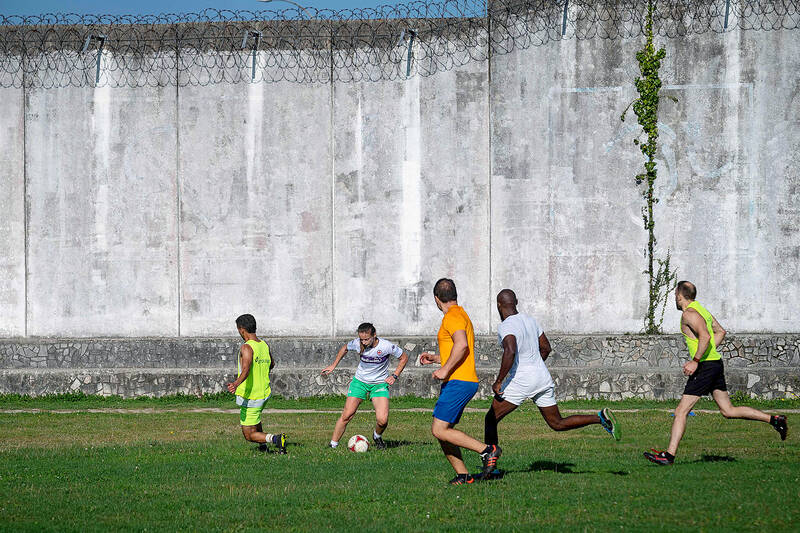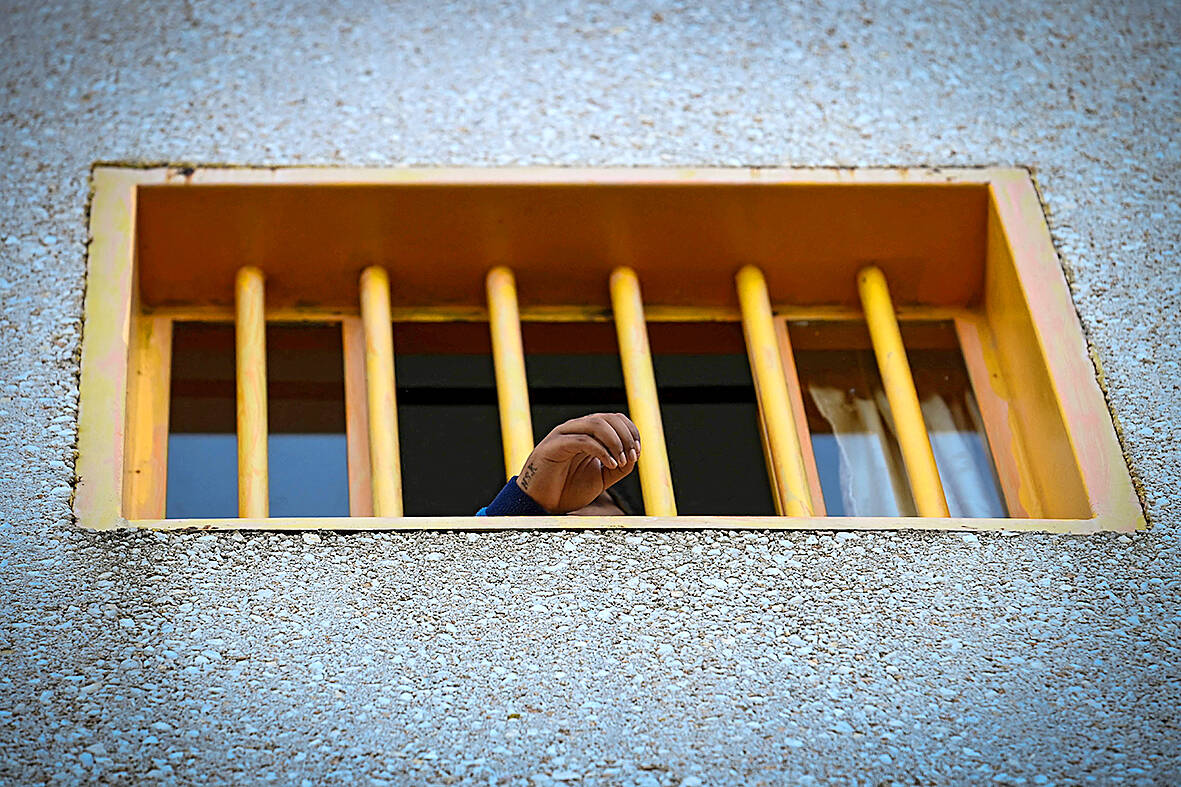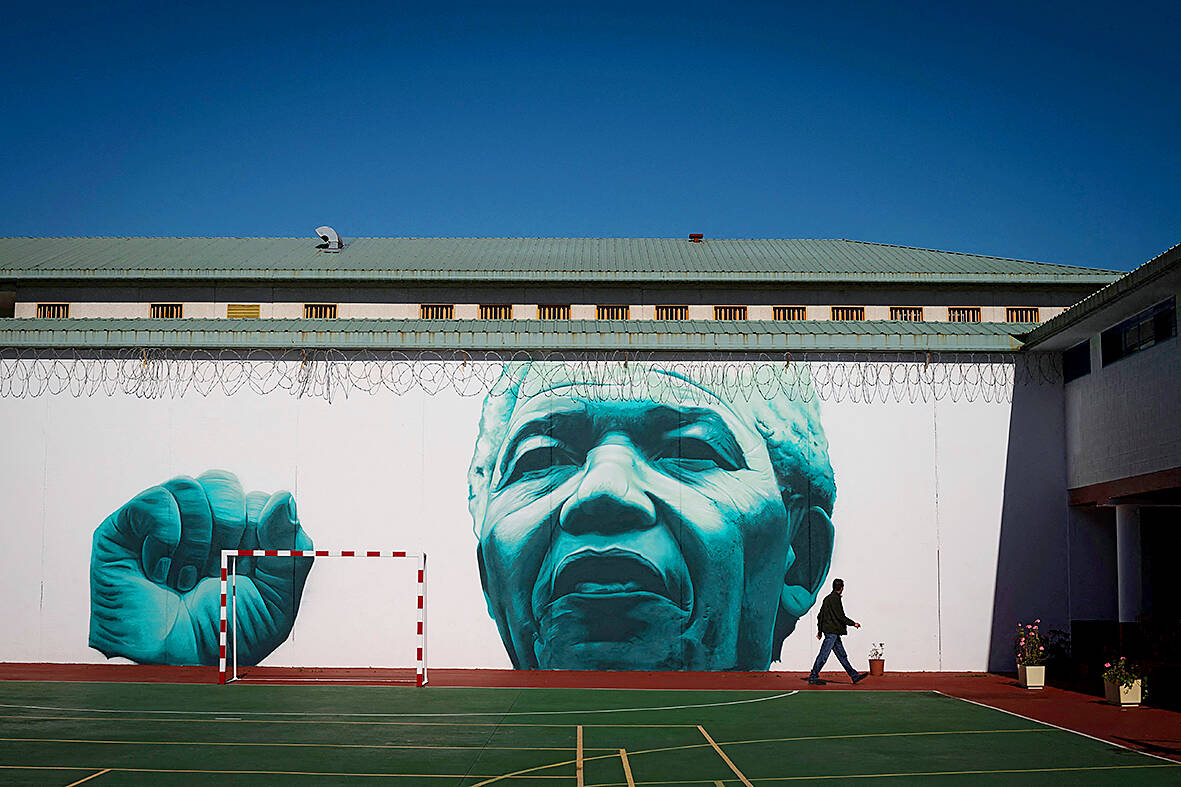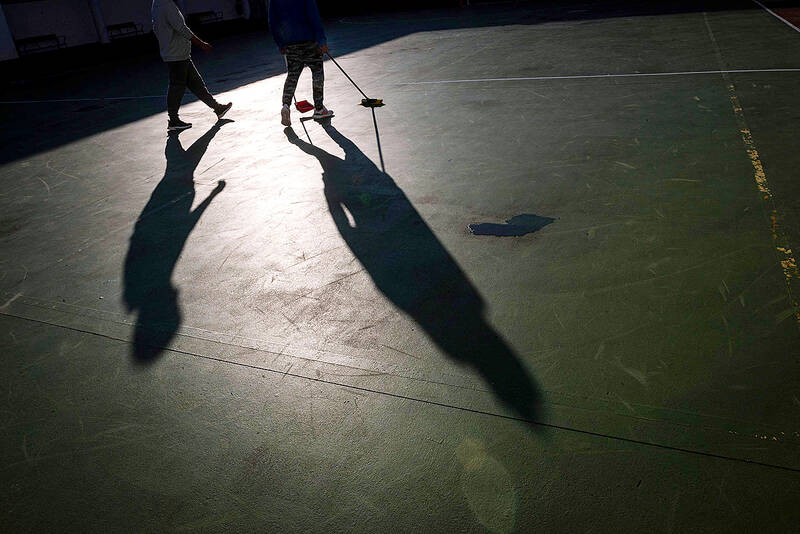At a jail in northwestern Spain, a sole female inmate played football with 21 male convicts, part of a push towards mixed prison living that remains rare in Europe.
“Let go of the ball!” Ambra, a 25-year-old Albanian who did not want to give her surname, shouted at one of her male teammates.
She pushed them as much as she was pushed to try to gain control of the ball.

Photo: AFP
“Why should prison be the only place without mixed spaces?” she wanted to know.
Men and women have been cohabiting since 2021 in one wing of the Teixeiro prison near La Coruna in Spain’s verdant Galicia region. The aim is to better prepare inmates for their reintegration into society once they are released.
Twenty of the 55 inmates in the jail’s Nelson Mandela cell block are women.

Photo: AFP
They and the men take part together in daily activities such as exercise, group therapy and vocational training.
They work and eat together.
The rest of the time, they live in separate cells although in the same hallway.

Photo: AFP
Inmates must volunteer to be part of this block and are selected based on their behavior. Prisoners convicted of sexual violence are excluded.
At the canteen, inmate Cristina prepared meals with other women and men, while at the gym Helga worked out with her male counterparts.
‘PREPARE FOR LIFE’

Photo: AFP
Considered a reference in Europe when it comes to women rights, Spain has for over two decades experimented with coed prisons.
There are currently 20 mixed-gender cell blocks in Spain, where 202 women and 925 men take part in joint activities. That is just a fraction of Spain’s total jail population of around 47,000.
But the government of Socialist Prime Minister Pedro Sanchez has encouraged the country’s prison system to further develop these mixed-gender cell blocks.
“It makes no sense for you to prepare for life outside jail with only half of the population,” said the deputy director of the Teixeiro prison, Nadia Arias.
She said coed jail blocks helped prisoners get used to being in a society where men and women co-exist.
The initiative also allows women prisoners, who are far fewer in number, to access the services and programs available to men, Arias said.
Ricardo, a repeat offender who has spent time in solitary confinement, said he hesitated when prison administrators suggested he moved to the mixed-gender cell block because he had “spent a lot of time with men.”
Now he says he prefers it since there are fewer tensions.
In an all-male prison block respect is earned by defending your belongings, and a “dirty look could lead to a knife fight or a fist fight”, the 47-year-old said.
‘GOOD IDEA’
Ambra, the 25-year-old Albanian, said men in the mixed-gender block sometimes misinterpret her friendliness and think she “wants to hook up, or something like that.”
“So I put up a barrier,” she explained.
Ana Suarez, a counsellor at Erguete, a non-governmental organization that helps people battling addictions and works with inmates in the jail, said “sexist behaviors happen inside prison just like outside.” The prison offers workshops to inmates on “deconstructing masculinity.”
The prison’s management said it has not experienced “any serious incidents” in the mixed block, which was in “great demand” from inmates wishing to join it.
Elsewhere in Europe, mixed jail blocks are not common.
In neighboring France, for example, where coed incarceration has been authorized since 2009, there are no jails where men and women are kept in the same area as in Teixeiro.
Men and women in French jails mix only during scheduled activities.
“I think it’s a very good idea to have men and women cohabiting because that’s how life is outside,” said Ambra.

Under pressure, President William Lai (賴清德) has enacted his first cabinet reshuffle. Whether it will be enough to staunch the bleeding remains to be seen. Cabinet members in the Executive Yuan almost always end up as sacrificial lambs, especially those appointed early in a president’s term. When presidents are under pressure, the cabinet is reshuffled. This is not unique to any party or president; this is the custom. This is the case in many democracies, especially parliamentary ones. In Taiwan, constitutionally the president presides over the heads of the five branches of government, each of which is confusingly translated as “president”

By 1971, heroin and opium use among US troops fighting in Vietnam had reached epidemic proportions, with 42 percent of American servicemen saying they’d tried opioids at least once and around 20 percent claiming some level of addiction, according to the US Department of Defense. Though heroin use by US troops has been little discussed in the context of Taiwan, these and other drugs — produced in part by rogue Chinese Nationalist Party (KMT) armies then in Thailand and Myanmar — also spread to US military bases on the island, where soldiers were often stoned or high. American military policeman

An attempt to promote friendship between Japan and countries in Africa has transformed into a xenophobic row about migration after inaccurate media reports suggested the scheme would lead to a “flood of immigrants.” The controversy erupted after the Japan International Cooperation Agency, or JICA, said this month it had designated four Japanese cities as “Africa hometowns” for partner countries in Africa: Mozambique, Nigeria, Ghana and Tanzania. The program, announced at the end of an international conference on African development in Yokohama, will involve personnel exchanges and events to foster closer ties between the four regional Japanese cities — Imabari, Kisarazu, Sanjo and

Sept. 1 to Sept. 7 In 1899, Kozaburo Hirai became the first documented Japanese to wed a Taiwanese under colonial rule. The soldier was partly motivated by the government’s policy of assimilating the Taiwanese population through intermarriage. While his friends and family disapproved and even mocked him, the marriage endured. By 1930, when his story appeared in Tales of Virtuous Deeds in Taiwan, Hirai had settled in his wife’s rural Changhua hometown, farming the land and integrating into local society. Similarly, Aiko Fujii, who married into the prominent Wufeng Lin Family (霧峰林家) in 1927, quickly learned Hoklo (commonly known as Taiwanese) and